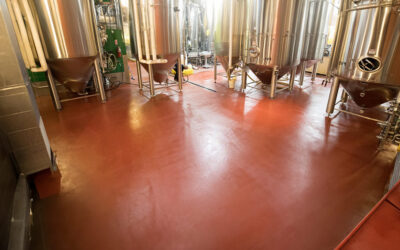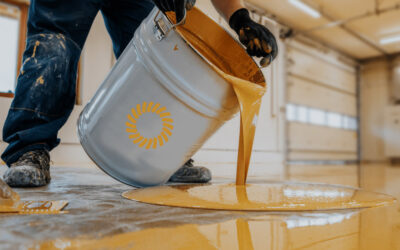Polyurethane Cement Flooring.
Polyurethane Cement Flooring
Polyurethane cement floors are created by applying a specialised type of concrete surface on top of an existing floor. Polyurethane cement has numerous benefits. It combines traditional concrete’s strength and durability with polyurethane’s flexibility and resilience.
Also known as urethane cement and polyurethane concrete, polyurethane cement floors are ideal for commercial use due to their general toughness, hygienic surface, chemical resistance, durability, thermal stability, slip resistance, and customisable aesthetics.
Using this floor material can especially help ensure a safe, clean, and efficient working environment in the food and beverage industry.
The benefits of Polyurethane Cement flooring
1. Hygienic Surface
Polyurethane provides a seamless and non-porous surface, making it easy to clean and sanitise. This is essential in the food industry, where cleanliness is paramount to prevent contamination and foodborne illnesses.
2. Chemical Resistance
Polyurethane cement is highly resistant to chemicals, including cleaning agents, acids, and oils commonly used in factories and processing plants. This makes it an ideal material for flooring in areas exposed to harsh chemicals.
3. Durability
This floor surface is extremely durable and can withstand heavy use, making it perfect for high-traffic areas. It is also resistant to impact and abrasions, reducing the need for frequent repairs and maintenance.
4. Thermal Stability
Urethane cement has excellent thermal stability and can withstand extreme hot and cold temperatures. This is essential in industries that use large freezers or have areas exposed to large temperature variations or where temperatures need to be regulated to ensure the quality and safety of products.
5. Slip-Resistance
Polyurethane concrete is slip-resistant, providing a safe working environment for employees. This is particularly important where spills and wet surfaces pose a hazard.
6. Customisable Aesthetics
The floor can be customised to match the aesthetic requirements of a particular food processing plant. Many colours can be custom-selected, allowing for a visually appealing and professional-looking workspace that enhances the overall image of the facility.
Check out this blog post for more details regarding colour choices.

7. Toughness
Polyurethane cement flooring is known for its toughness and durability. They can withstand heavy foot traffic, machinery, and equipment without cracking or chipping. The polyurethane mix creates a tough, abrasion-resistant surface that is highly resistant to impact, chemicals, and stains. They are ideal for use in high-traffic areas, such as factories, warehouses, and commercial kitchens, where the floors are subject to constant wear and tear.
With proper installation and maintenance, polyurethane concrete floors can last for many years, making them a cost-effective choice for businesses looking for a durable, long-lasting flooring solution.
8. Cleanliness and Sanitation
The smooth, non-porous surface created by the polyurethane coating prevents dirt, dust, and debris from getting trapped, making it easy to sweep and mop the floors. The coating is highly resistant to stains and chemicals, so spills can be wiped up quickly without leaving any permanent damage. Additionally, the surface is easy to sanitise, making it a popular choice for industries where cleanliness is essential, such as food and beverage production facilities, hospitals, and laboratories.
Overall, the ease of cleaning and maintaining the floor surface makes for a convenient and practical choice for businesses looking to keep their facilities clean and safe.
9. Life Span
With proper installation and maintenance, polyurethane floors can last for many years, making them a cost-effective choice for businesses looking for a durable, long-lasting flooring solution.
Epoxy or Polyurethane cement?
The differences between epoxy and polyurethane cement floors are their chemical makeup and their physical properties.
Epoxy is a thermosetting resin which hardens when exposed to heat or a catalyst. Epoxy floors are known for their hardness, durability, and chemical resistance, making them popular for industrial and commercial applications.
On the other hand, polyurethane is a thermoplastic polymer and, when integrated with cement creates floors known for their flexibility, impact resistance, temperature resilience and ability to withstand heavy loads and foot traffic.
Ultimately, the choice between epoxy and polyurethane cement flooring depends on the application’s specific needs, including the type of industry, the amount of traffic, the types of chemicals and substances present, and the level of flexibility and impact resistance required. For more information about benefits, see this article.
We at Diamond Grind are happy to discuss the differences in detail and help you make the best choice for your particular purposes.
Read more about Polyurethane Cement Flooring from our Blog.
Benefits of Epoxy and Polyurethane Cement Floors
This article makes it easy to compare the features of epoxy coats and paints, helping you choose the best option for your needs. Whether you’re looking for durability, aesthetic appeal, or ease of application, find out how epoxy solutions can transform your space. Read on to learn more and make an informed decision!
Polyurethane Concrete Floors, The Ideal Solution for Commercial and High-Traffic Areas
Uncover the unmatched durability and versatility of polyurethane concrete floors! Perfect for commercial spaces, these floors withstand heavy traffic, impact, and chemical spills while offering a seamless, non-porous surface resistant to stains and bacteria. Learn how polyurethane concrete floors can transform your space with customisable aesthetics and long-lasting performance. Read on to explore their benefits and applications!
Industrial Floor Coating
Choosing the right industrial floor coating is essential for durability, safety, and aesthetics. Explore the benefits of epoxy, polyurethane, polyaspartic, acrylic, and cementitious urethane coatings. Learn how each type meets specific needs, from high-traffic areas to chemical resistance. Make an informed decision for your industrial space with our comprehensive guide.
✅ Contact Diamond Grind
by Email or 1800 587 172
for an obligation FREE consultation.





